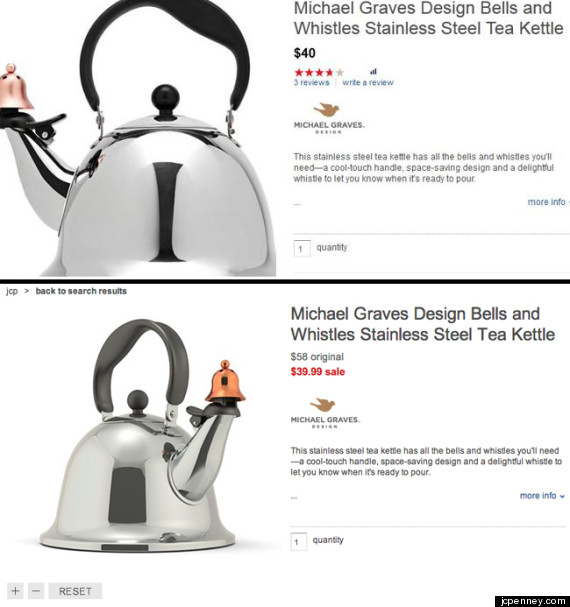J.C. Penney is going to war against a former employee who outed the department store for its questionable discounting practices.
The department store was drastically hiking prices on items, cutting them back and then advertising huge "discounts," the former employee, Bob Blatchford, told the Today show last July. In one case, a "rack of $7 shorts became $14, and then they were 50 percent off," a separate J.C. Penney worker told the Today show.
"I saw a lot of pricing teams going through the store, raising the prices, mostly doubling -- towels and clothing," Blatchford told NBC's Jeff Rossen. "Then they would go on sale, and they wouldn't always go on sale for 50 percent off. Not only was it a fake sale, but they were actually paying more than they would have been previously."
Ominously, Blatchford told Today, "I don't think Penney's will survive if they keep doing this."
Now it's Blatchford who is fighting for survival. Two days after his appearance on the "Today" show, he was fired from J.C. Penney in St. Petersburg, Fla., where he was a custom decorating studio coordinator. When he filed for unemployment benefits, J.C. Penney contested his claim, he said. J.C. Penney also recently filed an arbitration petition to get Blatchford to give back any company documents that he might have. But Blatchford thinks the arbitration is really just an attempt to discourage him from speaking out about the company.
J.C. Penney declined to comment on Blatchford's situation or its pricing strategy.
The fight between Blatchford and J.C. Penney belies an open retail secret: Discounts, sale prices and big promotions are largely a game of smoke and mirrors. But until J.C. Penney ousted its CEO last year and his successor reinstated old pricing strategies, it was a largely unconfirmed open secret.
Retailers use the sly tactic to manipulate customers' minds, said Mark Ellwood, author of Bargain Fever: How To Shop In A Discounted World. Once customers are taught to crave discounts, it becomes addictive, and they keep coming back for more. "We are chemically programmed to respond to sales," Ellwood said.

J.C. Penney's trouble with sale pricing started with CEO Ron Johnson, who in 2012 pledged to eliminate "fake prices" -- inflated prices used throughout the retail industry to convince customers they're getting a great deal. Johnson eradicated coupons, sales and discounts at the 112-year-old retailer.
Coupon-crazed shoppers revolted, with devastating consequences for J.C. Penney. Sales plummeted by an astonishing $4.3 billion in the first year of Johnson's turnaround plan. "Coupons were a drug," the CEO admitted on a 2012 conference call with investors and analysts. "They really drove traffic."
Johnson was fired in the spring of 2013. But even before his ouster, J.C. Penney began jacking up its "everyday prices," then discounting them to create the perception that customers were nabbing a deal, according to a report from Reuters.
When Mike Ullman retook the reins as CEO in April 2013, mass sales and coupons returned to the department store in a forceful attempt to regain the bargain-hunters.
That's when the scrutiny began. Consumer groups investigated the discounts, releasing numerous examples of sale prices that were actually higher than the original price tags. Local news stations probed stores through hidden-camera investigations. Time declared J.C. Penney's prices "faker than ever."
J.C. Penney insiders told HuffPost that customers have responded well to the price changes since their implementation. A regional executive, who spoke on condition he not be named for fear of retaliation by his employer, said customers don't understand that they're often "overpaying" for much of the merchandise, even though sales make prices appear cheaper than before. "Guess that's retail," he mused.
Take J.C. Penney's "Michael Graves Design Bells and Whistles Stainless Steel Tea Kettle," for instance. Originally priced at an even $40 under the previous CEO's no-sales strategy, J.C. Penney suddenly bumped the kettle up to $58 after discounts were reintroduced -- a 45 percent price hike. But J.C. Penney made sure to offer a sale, bringing the price back down to $39.99. It appeared that customers would save $18 by making the purchase.

J.C. Penney and department store competitor Kohl's were each slapped with class-action lawsuits in 2013, claiming their sales tactics violated consumer protection guidelines in the state of California, which has specific rules to protect consumers from misleading deals.
The federal guidelines against deceptive sale prices are more vague. According to the Federal Trade Commission: If the original price being advertised has been "offered to the public on a regular basis for a reasonably substantial period of time," then there is a basis for legitimacy. But if an artificially inflated price was created in order to promote a sale, that's considered a false bargain -- and could potentially be taken to court.
Marking up prices only to mark them back down as a promotion is a fairly universal practice, according to Robin Lewis, co-author of The New Rules of Retail and CEO of retail industry newsletter The Robin Report. But lately, retailers have become more aggressive due to intense competition.
"The sales seem to be getting deeper," said Lewis. "They're figuring out all kinds of different ways of discounting. Retailers have to fight tooth and nail for a share of the market. The growth is coming from stealing the customer away from a competitor, so the weapon of choice becomes price."
Lewis stressed that current CEO Ullman -- who also held the reins at J.C. Penney before Johnson's tenure -- had no choice but to return to the old ways of discounting, since the idea has been used for decades to great effect: "Ullman had to get the business righted. He had to stabilize it, and he had to do everything in his power to get the customers back. He had to go back to the tried-and-true pricing process," he said. J.C. Penney suffered a whopping $985 million loss in 2013, bringing the retailer to the brink.
Compounding Ullman's problems is a widespread loss of customer trust. For years, J.C. Penney customers perused the aisles for the best deals and discounts. Suddenly, that experience disappeared, and the betrayed shoppers left. "They threw their hands up, shut their wallets and walked out the front door," said Lewis.

Outspoken employees like Blatchford are interfering with J.C. Penney's path to repentance. Eight months after his firing, J.C. Penney filed a petition against Blatchford with the American Arbitration Association. In it, J.C. Penney characterized Blatchford's revelations on NBC that the company drastically hiked prices and then slashed them in order to tout a "sale" as "trade secret, proprietary and confidential business information."
J.C. Penney accused Blatchford of having an "unbalanced vendetta" against his former employer and a "love of media attention." The company claims that it was forced to bring the matter to arbitration in order to protect customers, and says Blatchford holds confidential business and customer records.
The struggling retailer must tamp down on the constant condemnation of its pricing tactics if it wants to reclaim the droves of customers it lost, according to Dorothy Crenshaw, CEO and creative director at public relations firm Crenshaw Communications. J.C. Penney knows this, she added.
"I'm sure they don't want people to be talking about it," Crenshaw said. "It is very likely how many stores operate, but this is much more of a drumbeat around a particular store, at a time that they least need it. They'd love for this whole thing to go away."
Visit NBCNews.com for breaking news, world news, and news about the economy
Clarification: Language has been amended to note that Ullman both preceded and succeeded Johnson as J.C. Penney's CEO.